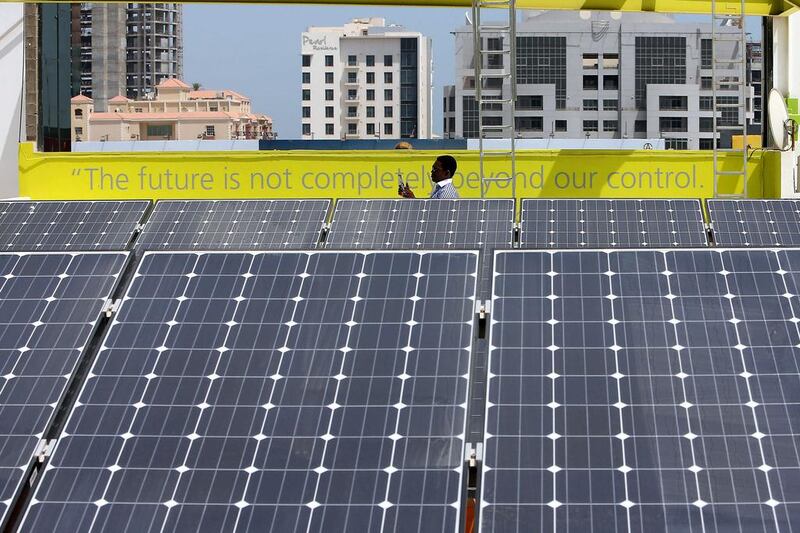Dubai plans to spend Dh50 billion by 2030 to help slash energy consumption by 30 per cent through new ventures such as solar energy, a top utility official said yesterday.
Although the UAE sits on more than 8 per cent of the world’s proven oil reserves, it is forging ahead with various projects to reduce dependence on fossil fuels. Abu Dhabi wants to generate 7 per cent of its total energy needs from renewables by 2020 and has created the green firm Masdar to undertake various projects to implement its green strategy. Dubai wants to produce 5 per cent of its power from solar by 2020.
But these projects may be jeopardised by any drop in oil prices, which bodes ill for renewable firms whose share prices have been hit hard this week. Clean energy investments fell to US$251bn last year from a peak of $317bn in 2011, according to a report in October by Bloomberg New Energy Finance.
The Dh50bn includes Dh10bn that is being spent to generate 1,000 megawatts of electricity from the Mohammed bin Rashid Al Maktoum Solar Park project and Dh7bn to create a so-called "smart" city initiative to reduce consumption, said Walid Salman, executive vice president-strategy and business development at Dubai Electricity and Water Authority (Dewa) at a green economy conference in Dubai.
As part of the city’s Smart Dubai initiative, residents and business owners who have installed solar energy panels to power their buildings can now feed the excess power generated back into the power grid, according to a new resolution issued by Sheikh Hamdan bin Mohammed, Crown Prince of Dubai.
Currently all electricity plants in Dubai run on gas, but by 2030 Dubai is planning to get 5 per cent of its energy needs from solar power, with coal to provide 12 per cent, nuclear 12 per cent and the remainder coming from gas.
Dubai intends to get nuclear power from Abu Dhabi, where the authorities are building a nuclear plant.
The authority is currently evaluating bids for a 100 MW solar photovoltaic plant and is planning to award the contract in the first quarter of next year.
Saudi Arabia’s Acwa Power is currently the lowest bidder for the solar project, which is expected to be commissioned before the summer of 2017.
Energy demand in Dubai is growing by 5 per cent a year, he said, adding that current installed capacity is 9,700 MW.
The UAE as a whole will need to generate 160,000 jobs by 2030 to achieve its green economy targets.
dalsaadi@thenational.ae
Follow The National's Business section on Twitter





